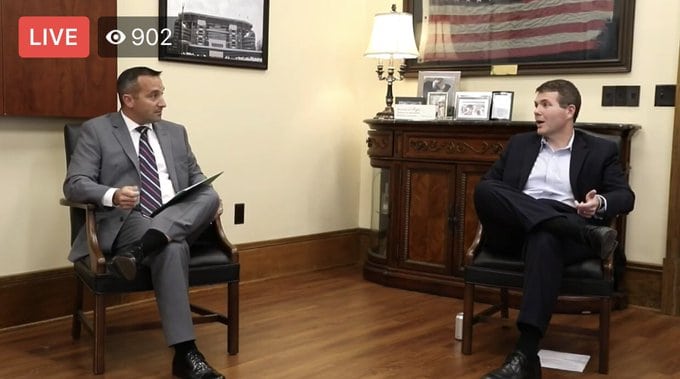City answers coronavirus questions in virtual town hall
March 20, 2020
Tuscaloosa Mayor Walt Maddox addressed the Tuscaloosa community via livestream on Friday to answer submitted questions concerning the city’s actions to fight the coronavirus.
Maddox, who has been active on Twitter throughout the developing pandemic, answered questions in a Q&A that lasted 38 minutes. Maddox sat alongside three guests: Tuscaloosa City Schools Superintendent Dr. Mike Daria, Tuscaloosa Fire and Rescue Chief Randy Smith, and City Attorney Glenda Webb. Here are the highlights, with questions that were most relevant to UA students.
Q: Are there still only 4 cases in Tuscaloosa?
A (Maddox): As of this moment, there is. There will be an update in a few moments from the Alabama Department of Health, but I would ask that you not look at that as a situational guide of where we are. It is likely that the tests are several days old, they take several days to process, and if you look back at the way the trend lines of what’s happened in other states and other countries, this is the calm before the storm if that trend line continues. Hopefully the actions that we’ve taken in the last couple of weeks mitigate that.
Q: I don’t have a car. How do I get screened?
A (Webb): If someone is exhibiting symptoms we encourage them to call 911. There are questions in regards to exposures and what the current symptoms are and if this individual that calls in is needing to be screened and is symptomatic, then there is emergency help available through the 911 system.
Q: Why can’t we know who has tested positive so we can make sure to stay away?
A (Maddox): We’ve had that discussion around the city. It is a fair question, and everyone wants to balance the right of the individual with the right of the public to know, and quite frankly, our responsibility to our first responders to stay safe, so it’s a very difficult issue to navigate through this process.
A (Webb): Although with the President’s federal declaration of emergency it does relax HIPAA rules and regulations to some extent, we do still have to protect the protected health information of the individuals who are testing positive, so that limits who can know and what form they can know. We are taking steps to protect that information if we are to receive it, because it is important to our first responders, however we don’t want to create any stigma or negativity that is undue.
A (Maddox): I think all of us, I think one of the rules of thumb I’ve been talking about lately is that we have to treat everyone as if they potentially have COVID-19. If we do that and we create the socially distancing and we work and apply common sense, I think we can go a long way in mitigating what we’re facing.
Q: Will UA students coming back to move their things out after spring break be kept away from the general public?
A (Maddox): There is no legal provision for me to be able to enact that, and certainly no way to enforce that. The University is working, though, on a move-in/move-out plan for university students who were in the dorms and can no longer go to live there. The University has been in constant communication with the City of Tuscaloosa, and I think their approach is wise and that should mitigate some of that contact within the general community.
Q: Are students who live off-campus allowed to return from Spring Break?
A (Maddox): Yes. And not that this has even been a policy discussion, but does the city have any legal authority to stop any student coming back from spring break?
A (Webb): We do not. That would be a presidential or statewide declaration.
A (Maddox): I know why this question comes up. I mean I think all of us look at the footage down from the Gulf coast and in Florida and think what in the world are they thinking at this time. I mean I certainly feel that way. I can tell you the Incident Command team, we feel the weight of the world on our shoulders, and when you see what you think is behavior that is not responsible it certainly doesn’t make you happy. At the same time, we have to follow laws that we swore an oath to and we will continue to do that. Hopefully we will continue to exercise, and everyone who comes back that did go to the beach will exercise, good judgment moving forth.”
While the City of Tuscaloosa continues to follow orders from both the federal and state governments, Webb asks citizens for one thing.
“I request voluntary compliance,” Webb said. “Remember that although you may be low risk, there are others that we come into contact with that are higher risk, and we want to protect those individuals and our loved ones so the best way to do that is to avoid unnecessary exposure.”
The full broadcast can be found here.








